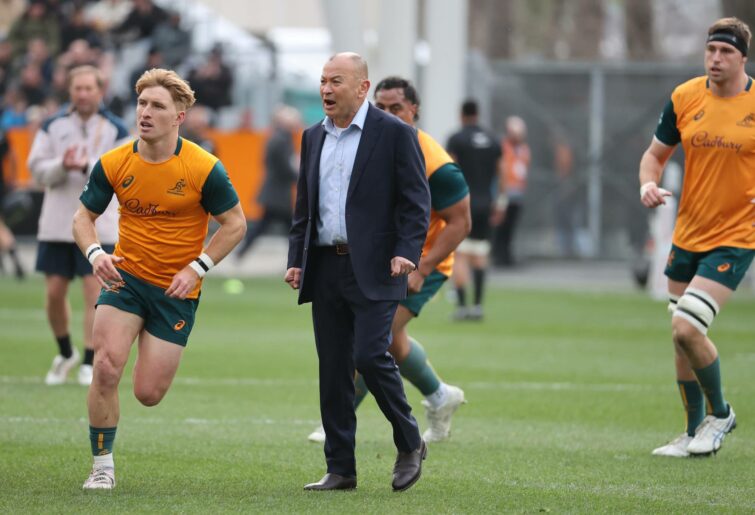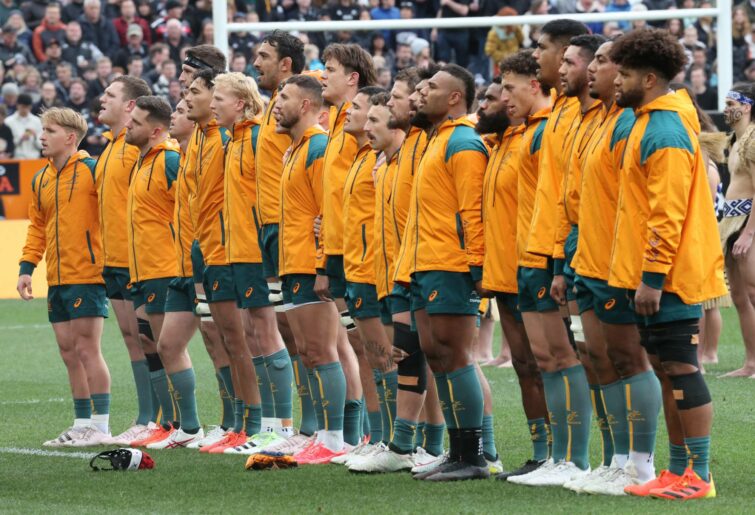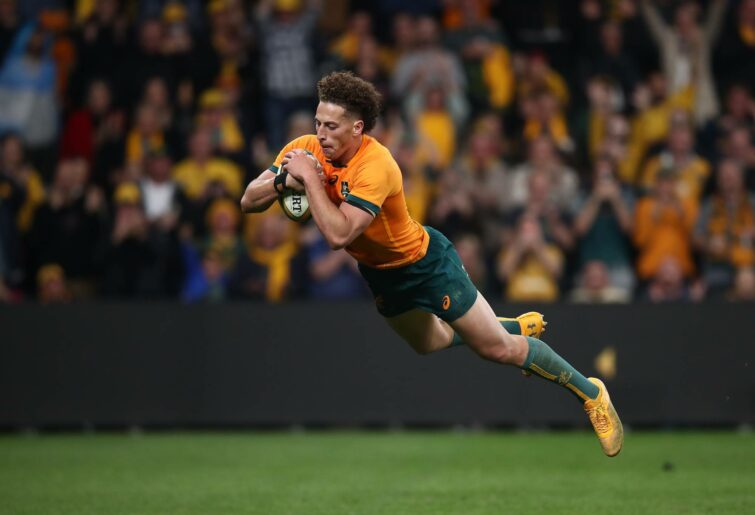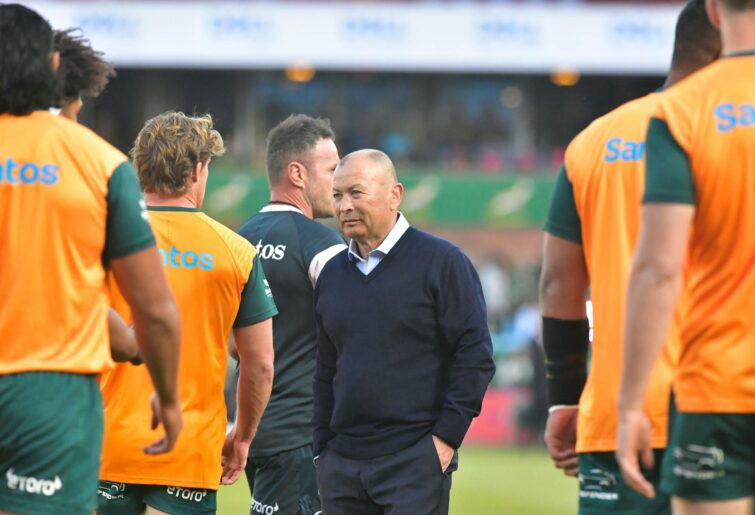Two of the movie world’s most talked about characters of the late 80s and early 90s were Kevin Spacey’s Keyser Soze, from ‘The Usual Suspects’, and Leslie Nielsen’s Frank Drebin, of the ‘Naked Gun’ franchise.
Nielsen has a long-standing association with rugby, name-dropping 2011 World Cup hero Stephen Donald in a famous scene with Priscilla Presley.
Spacey’s rugby credentials aren’t known, although he recently demonstrated nimble footwork, declaring himself ‘now uncancelled’ by Hollywood’s virtue-istas, after being found not guilty of sexual assault charges.
What sets Spacey’s Soze apart is his almost mythical status; according to Wikipedia, “the ambiguity of his true identity and whether he even exists inside the story’s reality.” Any rat-cunning rugby coach planning a smash and grab on the Rugby World Cup would do worse than to model themselves on the chameleon-like mastermind.
But those still trying to get their head around Eddie Jones’ 33-man World Cup squad, trying to reconcile selections with public statements, can be excused for wondering which Eddie and which reality is actually at play.
Has the previously announced smash and grab raid for 2023 suddenly been put on ice? Evidently so, if the swapping out of hardened criminals for a bunch of kids from detention is any guide.
Notice how the language has shifted, with Rugby Australia Chairman Hamish McLennan saying this week; “I’ve always encouraged Eddie to think about the Lions in ’25 and the Rugby World Cup in ’27, and to think long term.”

Eddie Jones gives instructions. (Photo by Peter Meecham/Getty Images)
While Jones and McLennan have not conceded this World Cup – everyone has a starter’s chance and Australia has a soft draw – the signalling to fans to lower their expectations is obvious. ‘Don’t be upset if we come home from France without the World Cup, think about what we’re putting in place for ’27 instead.’
Having that swallowed by the media and rugby public is an act worthy of Soze himself. Imagine Dave Rennie announcing this year that he was changing tack, swapping experienced players out for new talent because he was eying off the 2027 World Cup? The anger would have been palpable and Rennie laughed out of town.
The difference is that, as a new coach, Jones is afforded the courtesy of picking his own team and starting again. Not just a courtesy, but a condition of employment, with Jones noting at the press conference immediately following the squad announcement, “I was brought in to change the team.”
Even so, contradictions and inconsistency abound.
The new narrative is that, in shifting away from what hasn’t been working, Jones is, as described by Julian Linden in Saturday’s ‘The Australian’, “throwing all his chips on youth”.
That might neatly capture the selection of 18-year-old Max Jorgenson and the by-passing of players like Quade Cooper, Jed Holloway and Pete Samu, but evidently, every youth policy must have exceptions, as the selection of 132-Test veteran James Slipper would indicate.
And what of Suli Vunivalu? Is there anyone who believes that, approaching 32-years-old, Vunivalu will be a serious contributor at the 2027 World Cup? Cynics might even say that the reason Rebels loose forward Josh Kemeny has been named as a utility for this World Cup, is to allow him to be selected ahead of Vunivalu on the wing, in the pool match against Portugal.

(Photo by Peter Meecham/Getty Images)
Note that I’ve excluded Michael Hooper from this part of the conversation. This season and last have been a struggle for Hooper; body and mind not as willing as they once were. After 124 Test matches and 169 Super Rugby games, all of them played at full intensity, it is no slight on Hooper that this World Cup came around slightly too late.
It is one thing to omit a player of Hooper’s stature because a dicky calf has been stubbornly slow to repair itself. But while Jones will not have meant any disrespect, in sending Hooper off to pasture in the midst of comments that Australian rugby cannot afford to “stick to the same bunch of blokes who have failed over and over”, it feels like the opportunity for a kinder and more fitting send-off has been missed.
That’s a neat segue into the issue of culture, and there can be no question that a losing mentality has entrenched itself at Australia’s elite level over what is now two generations of players. Naturally, Jones wants to change this.
Laying a foundation for that change, Jones says that Australian rugby has lost its team spirit, and points to the need to overhaul a Wallabies team that has “deep cultural issues”.
With Jones a notoriously hard task-master, it is evident that where spirit intersects with work ethic, players like Pone Fa’amausili, Tom Hooper and Mark Nawaqanitawase have matured and benefitted physically this year, via their inclusion in Jones’ squad.

(Photo by Jason McCawley/Getty Images)
But where team culture extends to off the field, this is another area where some of the messaging is as confused as it is convenient.
Here’s McLennan back in January this year, after the sacking of Dave Rennie and installation of Jones; “I would rather we have somebody who’s really tough and we win World Cups, than we have a Kumbaya session, everyone holds hands and we fail.”
This weekend in ‘The Australian’, McLennan spoke of “our culture, our swagger and who we want to be as Australians.”
Is it really as simple as Rennie = soft = losing culture; Jones = tough = winning culture? Perhaps what Australian fans want to be as Australians is to support a side with a winning chance at this World Cup, not be sold the promise of a more competitive showing in 2027?
The very act of throwing out the old and replacing it with the new might signal change, but does not, in itself, guarantee a change of outcome. There is of course the pesky issue of the Wallabies’ opponents – almost all of them with far more developed high performance domestic structures, talent pathways and coaching depth – having their say.
If the discarded players lacked a winning mentality, what evidence points to the new additions having it? Players who come from the same battling Super Rugby sides, and who have just experienced four successive Test losses under Jones?
Even if the mentality is right, some of the stats are eye-opening. Of the 33 players selected, 15 have 5 caps or fewer. Only four players are over 30 years of age. None of the locks or loose forwards have been to a World Cup before.
World Cup winners average over 40 caps per man, across their squad; the Wallabies average under 20. Already low, the Wallabies’ TWI (Team Work Index) just fell through the floor.
Goalkicking has been loaded onto the shoulders of two youngsters, six caps between them, both of whom are not first-choice kickers for their Super Rugby franchise.
Will Skelton might be a welcome addition to the team, but by all accounts, had to be asked three times before accepting the captaincy. His career captaincy record stands at one attempt for one loss.
The hope is that this World Cup will be the making of Jones’ young squad. But without senior mentors to lean on and learn from – think Sam Whitelock, Willie Le Roux, Jonathan Sexton – a lot is being asked of a coaching group which itself lacks experience.
Whatever happens, Australia’s friendly draw keeps them in the race. There are many talented, committed players in the squad who will give their all. They deserve the unconditional support of Australia’s fanbase, and they will surely get it.
None of which makes the situation as it stands any easier to rationalise.
The main reason things are why they are today is timing. Once McLennan opted to snare Jones outside of the four-yearly World Cup cycle, the risk was always that this event would come around before Jones was ready.
With Rennie already having tried two squads worth of players across the previous three seasons, the expectation was that selection would narrow this year and combinations built. Instead, Jones has not only cast the net even wider, but kept casting it, right up until the moment he announced his squad.
Whatever the respective merits of Ryan Lonergan and Issak Fines-Leleiwasa, one wonders what each of them has done over the last month to trigger their respective demotion and promotion?
All of this supports the notion that the judgment day can has been kicked well and truly down the road. ‘If something good happens in the meantime, sure, we’ll take it. But don’t say we didn’t warn you’.
It is true that all sides experience peaks and troughs and rebuild themselves. Incoming All Blacks coach Scott Robertson will take the reins with a number of New Zealand’s best, and most experienced players no longer at his disposal.

Wallabies coach Eddie Jones. (Photo by Sydney Seshibedi/Gallo Images/Getty Images)
But has there ever been a nation in the professional era choose to rebuild in the year of a World Cup, let alone use the tournament itself in which to do it?
That wasn’t the deal McLennan sold to Australian rugby fans when he hired Jones. What is now being sold is reverse engineering of the highest order.
The lead-in to a World Cup is invariably marked by a laughable jockeying for position by the leading contenders, desperate to avoid being tagged favourite, all trying to claim underdog status. Nobody can accuse Australia of playing any part in that charade.
Instead, Wallabies’ fans are left to take whatever crumbs are on offer, heeding Frank Drebin’s words, “like a blind man at an orgy I was going to have to feel things out.”
Everything points to Drebin holding the reins. But as long as Eddie Jones is still in the contest, working and cajoling his players, making headlines, getting inside the heads of opposing coaches, being… well, Eddie, there is always a sneaky chance that lurking somewhere in disguise, it is Keyser Soze who is pulling the strings.
































































































